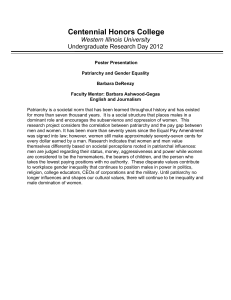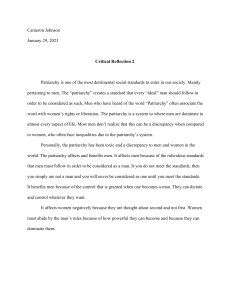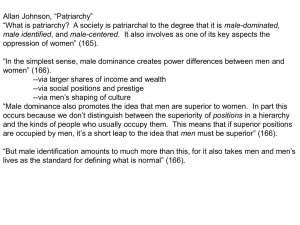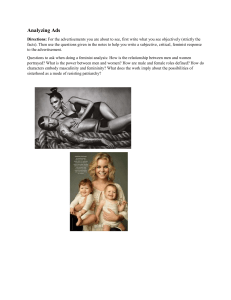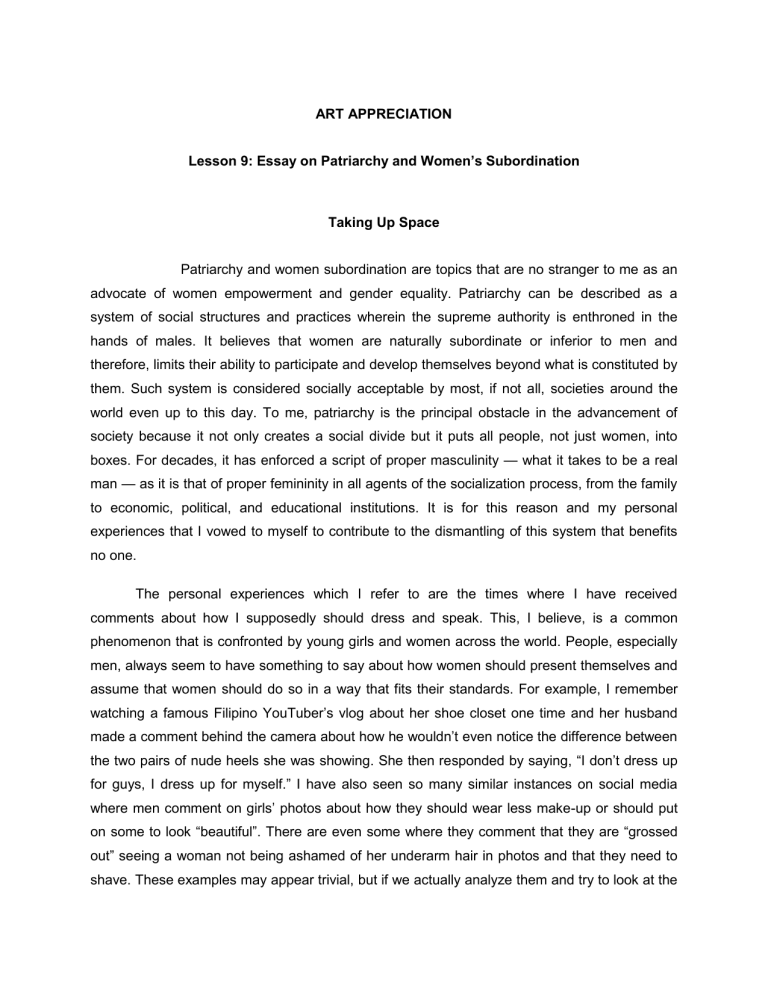
ART APPRECIATION Lesson 9: Essay on Patriarchy and Women’s Subordination Taking Up Space Patriarchy and women subordination are topics that are no stranger to me as an advocate of women empowerment and gender equality. Patriarchy can be described as a system of social structures and practices wherein the supreme authority is enthroned in the hands of males. It believes that women are naturally subordinate or inferior to men and therefore, limits their ability to participate and develop themselves beyond what is constituted by them. Such system is considered socially acceptable by most, if not all, societies around the world even up to this day. To me, patriarchy is the principal obstacle in the advancement of society because it not only creates a social divide but it puts all people, not just women, into boxes. For decades, it has enforced a script of proper masculinity — what it takes to be a real man — as it is that of proper femininity in all agents of the socialization process, from the family to economic, political, and educational institutions. It is for this reason and my personal experiences that I vowed to myself to contribute to the dismantling of this system that benefits no one. The personal experiences which I refer to are the times where I have received comments about how I supposedly should dress and speak. This, I believe, is a common phenomenon that is confronted by young girls and women across the world. People, especially men, always seem to have something to say about how women should present themselves and assume that women should do so in a way that fits their standards. For example, I remember watching a famous Filipino YouTuber’s vlog about her shoe closet one time and her husband made a comment behind the camera about how he wouldn’t even notice the difference between the two pairs of nude heels she was showing. She then responded by saying, “I don’t dress up for guys, I dress up for myself.” I have also seen so many similar instances on social media where men comment on girls’ photos about how they should wear less make-up or should put on some to look “beautiful”. There are even some where they comment that they are “grossed out” seeing a woman not being ashamed of her underarm hair in photos and that they need to shave. These examples may appear trivial, but if we actually analyze them and try to look at the bigger picture, we can see that it is an effect of patriarchy. In a society that embraces patriarchal views, men feel the need to correct women on the things they do when they do not fit into the norms and believe that their opinions hold more value so women should agree and follow. It is important also to point out that the effects of patriarchy are far-reaching and are not just limited to beauty standards. Patriarchal influences are embedded so deeply in society and culture that women have to work twice as hard to be considered to be on equal footing as their male counterparts or even respected, across all industries and institutions. Despite the progress that feminist movements have done for women regarding these issues, there is still work to be done and I have made it part of my life’s purpose to do my part. I really hope that I get to live a future where women no longer question their worth or their individual choices because of unsolicited disparaging remarks on the way they look and the way they should be or act for women are powerful beings, nothing at all like what society and patriarchy describe us to be. If young girls and women, in the famous words of the longest-reigning Miss Universe in history, Zozibini Tunzi, take up space in society and work collectively, I don’t see why this future can’t happen. References: Aggarwal, S. (2016). Patriarchy and Women’s Subordination. Bhartiyam International Journal of Education & Research, 5(4). http://www.gangainstituteofeducation.com/september/2.pdf Sultana, A. (2012). Patriarchy and Womens Subordination: A Theoretical Analysis. Arts Faculty Journal, 4, 1-18. https://doi.org/10.3329/afj.v4i0.12929
